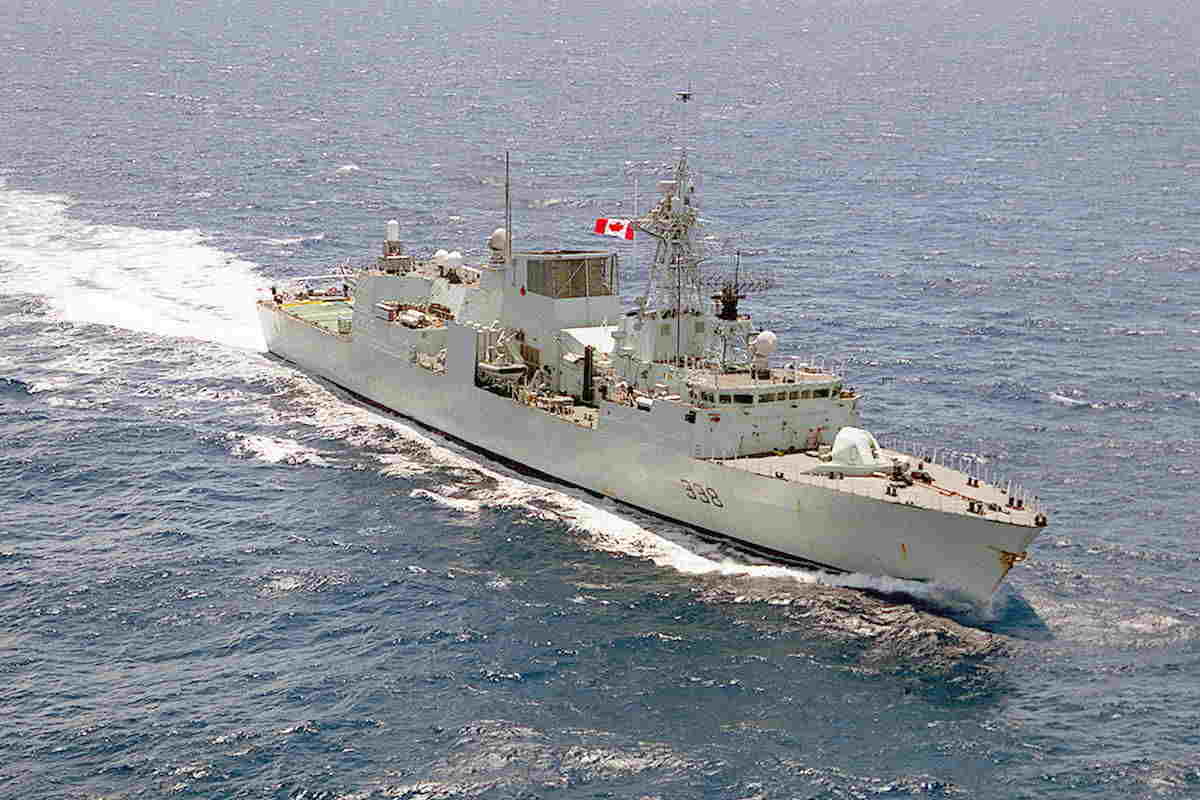

Canada ship
<p>
Last week, a Royal Canadian Navy warship sailed through Taiwan Strait&mdash;an approximately 160-km strip of water that separates Taiwan from China. The strait lies between the conflict-ridden South China Sea and the East China Sea. The navy ship will also participate in exercises with the US, Australian and Japanese navies in the East China Sea later this month.</p>
<p>
Media reports from Canada say that the exercise will be held in Japanese territorial waters, which are often frequented by Chinese Naval and Coast Guard vessels. Taiwan&#39;s Defence Ministry issued a cryptic statement this Saturday saying that the Canadian corvette sailed into the Taiwan Strait from the South China Sea, then headed north. The Ministry added that Taiwanese armed forces monitored the ship when it was in the strait. The statement did not say anything further.</p>
<p>
The Canadian ship&#39;s presence comes at a time when tension is mounting in the region. China has aggressively violated the Taiwanese air space forcing the island nation to scramble its jets often. China has even flown its jets around Taiwan when senior US officials have been on official visits to Taipei. The Chinese Navy too has been spying on Taiwan from international waters, close to where its defence forces test their weapons, once again making the tiny nation send its ships to deal with Chinese infiltration.</p>
<p>
Quad meet: India for strong Indo-Pacific and open seas Besides Taiwan, the US too has been indulging in a show of might in the region. It has been sending its aircraft carriers as well as bombers in solidarity with Taiwan and also to send a message to China. It was in such a highly militarized and hostile atmosphere that the Canadian Navy ship sailed through the waters that separate China and Taiwan.</p>
<p>
Now it plans to stay for some more time in the East China Sea, which again like the Taiwan Strait, sees much maritime action from Chinese vessels close to the Japanese coast. With rising global tensions due to the coronavirus pandemic and Chinese belligerence against many neighbors, Canada too has begun to decide which side it would like to be seen on and how it would like to deal with China.</p>
<p>
China enters Vietnam waters, bullying in South China Sea rises The recent talks between counterparts&mdash;Canadian Prime Minister Justin Trudeau and new Japanese Prime Minister Suga Yoshihide&mdash;which dealt with the &quot;free and open Indo-Pacific&quot; (FOIP) are one indication. The two leaders discussed the sensitive situation emerging out of Beijing&#39;s assertion over land and maritime rights of many countries in both seas&mdash;the South China Sea and the East China Sea. This is where the Canadian military ship is right now.</p>
<p>
A map of the Taiwan Strait, where Canada Navy&#39;s warship HMCS Winnipeg sailed last week on way to East China Sea[/caption] With the usage of &quot;free and open Indo-Pacific&quot;&mdash;a term that former Japanese Prime Minister Shinzo Abe used often, becoming a more fashionable term than the earlier-used Asia-Pacific&mdash;Canada is re-drafting its foreign policy towards this region. This change in the nomenclature by Canada at the highest levels is noteworthy in this season of re-alignment as many countries are forging new alliances over the dragon breathing fire.</p>
<p>
Till last year, it was believed that the Canadian leadership was ambivalent about its relations with China, which had been trotting downhill over the past couple of years. However, there had been a major divergence of opinion between the Canadian public and its leaders which the latter was not aware of.</p>
<p>
Eventually, the government formed the Canada-China relations committee in December 2019 to comprehensively look into the bilateral relationship governing the two countries. Relations began souring after Canada arrested Meng Wanzhou, the chief financial officer of Chinese telecom giant Huawei, in December 2018 on behalf of the US. In retaliation, China arrested two Canadian nationals Michael Spavor and Michael Kovrig for spying and also imposed trade sanctions. China also has been sending ice-breaking ships up north, close to the Canadian borders, about which many Canadians are not too happy.</p>
<p>
The public mood in Canada is one of resentment against China. People from many nationalities have been holding protest demonstrations outside the Chinese Embassy over its treatment of ethnic minorities and denial of human rights to people. Indians and Tibetans have been protesting against China over its encroachment of Indian territory and for creating a war-like situation on the border.</p>
<p>
Canadians are angry over the treatment meted out to the two Michaels. They are unhappy with Huawei&#39;s insistence on conducting 5G work in Canada and also want reduced trade with the communist country. On October 1, a big day for the communist party and nation, the Canadian people forced their government not to fly the Chinese flag in Toronto. With the Trudeau government catching the signals&mdash;both global and local&mdash;it is tweaking its China policy towards favorable global winds. For India, and indeed many countries in the region, it is a good sign.</p>
The Government of Myanmar has expressed deep gratitude for India's swift and substantial support in…
Protesters affected by the Diamer-Bhasha Dam project offered Eid-ul-Fitr prayers at their ongoing protest camp…
External Affairs Minister S. Jaishankar recognised the screening of 'The Diplomat' in Israel for a…
By Rajnish Singh Operation Brahma by India is operating at full tilt aimed towards providing…
Indian Naval Ship (INS) Tarkash successfully intercepted and seized over 2500 kg of narcotics in…
The Rajasthan Samagra Kalyan Sansthan (RSKS India) made a significant impact during the 58th session…